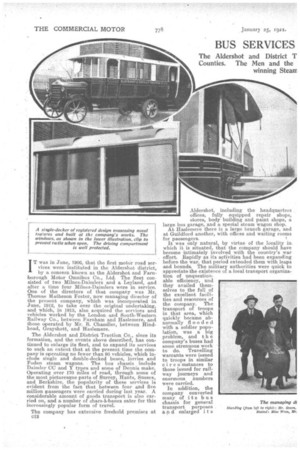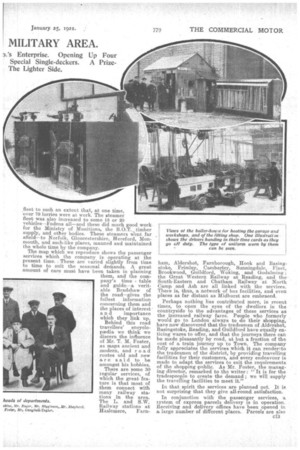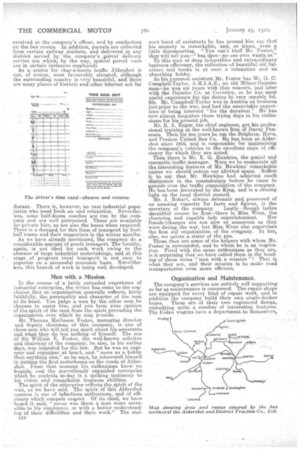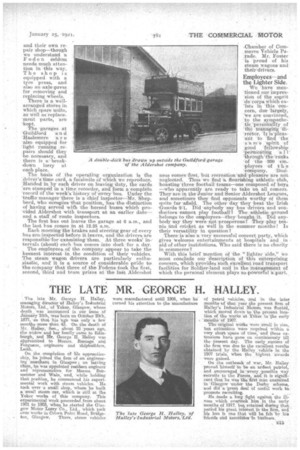BUS SERVICES MILITARY AREA.
Page 12

Page 13

Page 14

Page 15

If you've noticed an error in this article please click here to report it so we can fix it.
IT was in June, 1906, that the first motor road services were instituted in the Aldershot district, by a concern known as the Aldershot and Farnborough Motor Omnibus Co., Ltd. The fleet consisted of two Milnes-Daimlers and a Leyland, and after a time four Milnes-Daimlers were in service. One of the directors of that company was Mr. Thomas Matheson Foster, now managing director of the present company, which was incorporated in June, 1912, to take over the original undertaking, and which, in 1913, also acquired the services and vehicles worked by the London and South-Western Railway Co. between Farnham and Haslemere, and those operaied by Mr. B. Chandler, between Hindhead, Grayshott, and Haslemere.
The Aldershot and District Traction Co., since its formation, and the events above described, has continued to enlarge its fleet, and to expand its services to such an extent that at the present time the company is operating no fewer than 96 vehicles, which include single and double-decked buses, lorries and Foden steam wagons. The bus chassis include Daimler CC and Y types and some of Dennis make. Operating over 170 miles of road, through some of the most picturesque parts of Surrey, Hants, Sussex, and Berkshire, the popularity of these services is evident from the fact that between four and five million passengers were carried during last year. A considerable amount of goods transport is also carried on7 and a number of chars-h-lbancs cater for this increasingly popular form of travel.
The company has extensive freehold premises at 012
Aldershot, including the headquarters . offices, fully equipped repair shops, stores, body building and paint shops, a large bus garage' and a special steam wagon shop.
At Hasiernere there is a large branch garage, and at Guildford another, with offices and waiting rooms
for passengers. 1•
It was only natural, by virtue of the locality in, which it is situated, that the company should have become intimately involved with the country's war effort. Rapidly as its activities had been expanding before the war, that period extended them with leaps
In addition, the company converted many of its bus chassis for general transport purposes and enlarged its .fleet to such an extent that, at one time, over 70 lorries were at work. The steamer fleet was also increased to some 18 or 20
vehicles—Fodens all—and these did much good work for the Ministry of Munitions, the B.O.T. timber supply, and other bodies.. These steamers went far afield—to Norfolk, Gloucestershire, Hereford, Monmouth, and such-like places, manned and maintained the whole time by the company. The map which we reproduce shows the passenger services which the company is operating at the present time. , These are varied slightly from time to time to suit the seasonal dethands. A great amount of care must have been taken in planning them, and the company's time table and guide—a veritable Bradshaw of the road—gives the fullest information concerning them and the places of interest a n cl importance which they link up. Behind this road travellers' encyclopmdia we think we discern the influence of Mr. T. M. Foster, as maps ancient and modern, and road routes old and new are said to be amongst his hobbies.
There are some 30 regular services, of which the great feature is that most of .them connect with many railway stations in the area. The L. and S.W. Railway stations at Haslemere, Earn ham, Ald-ershot, Farnborough, Hook and l3asingstoke, Frirnle3r, Camberley, Swaningdale, Fleet, Brookwood, Guildford, Woking, and Godalming ; the Great Western Railway at Reading, and the South-Eastern and Chatham Railway at North Camp, and Ash are all linked with the services. There is, thus, a network of bus facilities, and even places as far distant as Midhurst are embraced.
Perhaps nothing has contributed more, in recent times, to open the eyes of the dwellers in the countryside to the advantages of these services as the increased railway fares. People who formerly would go to London always to do their shopping, have now discovered that the tradesmen of Aldershot, Basingstoke, Reading, and Guildford have equally enticing wares to offer, and that the journeys there can be made pleasantly by road, at but a fraction of the cost of a train journey up to Town. The company fully appreciates the services which it can renderito the tradesmen of the district, by providing travelling facilities for their customers, and every endeavour ismade to adapt the services to suit the requirements of the shopping public. As Mr. Foster, the managing director, remarked to the writer : "It is for the tradespeople to create the demand; we will supply the travelling facilities to meet it."
In that spirit the services are planned out. It is not surprising that they give all-round satisfaction.
In conjunction with the passenger services2 a tystem of express parcels delivery is in operation. Receiving and delivery offices have been opened in a large number of different places. Parcels are also
received at the company's offices, and by conductors on the bus routes. In p,c1dition, parcels are collected from certain railway stations, and delivered in any district served by the oompany's, parcel delivery service (on which, by the way, special parcel vans are in certain instances employed). As a centre for char-a-bancs traffic Aldershot is not, of course, most favourably situated, although the surrounding country is very beautiful, and there are many places of historic and other interest not far distant. There is, however, no. vast industrial population who need fresh air and relatation. Nevertheless, some half-dozen coaches are run by the company and are well patronized. These are available for private hire, as are also the buses when required.. There is a demand for this form_ of transport by football teams and their supporters in the winter months.
As we have already mentioned, the company do a• considerable a,monnt of goods transport. The locality, again,is not ideal for such, work owing to the absence of large industrial undertakings,. and, at this stage of progress rural transport is not easy to organize on a. successful economic basis. Neverthele-ss, this branch of work is being well developed.
Mtn with a Mission.
In the course of a fairly extended experience of industrial enterprise., the writer has come to the concluslon that an organization generally reflects, fairly faithfully, the personality and character of the man at. its head. You judge a man by the other. men he chooses to assist him, andyou. form your opinion of. the spirit of the man from the spirit pervading the organization over which he may preside.
Mr. .Theinas Matheson Foster, managing director and deputy chairman of this company, ss one of. thosemen who will tell you much about his assistants and what they do but nothing of himself. The son of Sir William E. F'oster, the well-known solicitor and chairmalr of the company, he also, in his earlier days, was intended for the law. But he was an engineer and. organizer at heart, and "more as a hobby than anything else," as he. says, he: interested himself in patting the, first motorbuses, on the roads of Aldershot. From that moment his enthusiasm knew no bonnds, and the marvellously" expanded enterprise. which he controls to-day is a striking testimony to his vision and remarkable business abilities.
The spirit Of the enterprise reflects the spirit of the man, as we have said. The spirit of this Aldershot concern is one of infectious enthusiasm, and of efficiency which compels respect. Of its chief, we have heard it. said, "never was there a man more accessible to his employees, or with a better understanding of their difficulties and their work.'' The stal 014 wart band of assistants he has around him say that his memory is remarkable, and, at times, even a
little disconcerting. "You can't. bluff Mr. -Foster," they will tell you—, tlrus-iso one ever wants to."
To this man of deep sympathies and extraordinary business efficiency, the collection of beautiful old fur niture and books is at once a relaxation and an absorbing hobby. As his personal assistant Mr.. Foster has Mr. G. C. Canaphell-Taylor, an old IClues-Daimler
man.--be was six years with that concern, and later
virii4. the, Daimler Co. at Coventry, so he has most useful experience for the. duties he very capably ful fils. Mr. Campbell-Taylor was in Austria on business just prior to the war, and had the unenviable experience of being interned "for the duration." He has now almost forgotten those trying days in his enthusiasm for his present job.
Mr. B. A. Eager, the aid. engineer, got Ws professional training at the well-known firn?. of Davey Pax mans. Then fortes years he ran the Brighton, Hove, and Preston United Bus Co. He has been at Aldershot since 1916, and is responsible for maintaining the company's sehicles in the excellent state of efficiency for which they are noted Then there is -Mr. E. G. Hawkins, the. genial and energetic traffic. manager. Were we to einimerate all
the. interesting features of Mr. Ha.wkiris remarkable eaKeer we should outrun our allotted space. Suffice
ta. say that 3.1r. Hawkins had achieved much .,(kuOinction in the constabulary before he came to weside over the traffic erganization of the company. He has been decorated by the King, and is a shining light on the local district council.
Mr. J. Hobart, always debonair and possessed of an amazing capacity for facts and figures, is the secretary of the company. Lastly—though ladies shouldief course be first—there is Miss Wren, the. charming and capable lady superintendent, Her
femaleVharges are. not now so niunerous as they were during the war, but Miss Wren' also supervises the first aid organization of the company. In her, also, we salute a sister of the pen. These then are some of the helpers with whom Mr. Foster is surrounded, and, to whom he is an inspiration. Fired with the same enthusiasm as they are, is it surprising that, we have called them in the heading-of thee Rotes "men with a mission"? That in what they are, and their missicin is to make road transportation even more efficient.
Organization and Maintenance.
The company's services are entirely self supporting so far as maintenance is concerned'. The repair sh.ops are equipped for every kind of repair work, and in. addition, the company build their awn single-decker buses. These are of their own registered design, embodying quite a number of interesting features. The Foden wagons have a department to themselves,.
and their own repair shop—though we understand a Foden Seldom needs much attention in this WAy. The shop is equipped. with a Lyre press, and also an axle press for removing and replacing wheels.
There is a wellarranged stores in Which spare Wilts, as well as replacement parts, are kept.
The garages at
'Guildford an d Haslemere a,re also equipped for light running •repairs should: they be necessary, and there is abreakdown lorry at each place.
• The basis of the operating organization is the driver's lime card, a facsimile a -which we reproduce. Harided in by each driver on leaving duty, the cards are stamped in a tiine recorder, and form a complete 'record of the week's history of every bus. Under the 'traffic manager there is a chief inspector—Mr. Shepherd, Who -6ecuPies that position, has the distinction of having served with the horsed 'buses which provided Aldershot with transport at an earlier date— and a staff of route inspectors
The first bus out leaves the garage at 6 a.m., and the last bus comes in at 12.25 a.m.
Each morning. the brakes and steering gear of every bus are insp-ected loefore itleaxes, and the drivers, are responsiblefor -examining•them. At three weeks' in-. tervals (about) each 'hos comes into dock for a day. . The employees of the company appear to take the keenest intereA in the condition of their .vehicles. The steam wagon drivers are particularly enthusiastic, and it is a source of considerable pride to the company that three of the Fodens 'took the first, second, third end team prizes at the lait Aides-shot -Chamber of Commerce Vehicle Parade. Mr. Foster is proud of his steam wagons and their drivers.
Employees—and the Lighter Side.
We have mentioned our impression of the esprit de' corps which exIsts hl this eoncern, due largely, We are convinced, to the sympathetic personality of the managing di rector. ft-is'preas ant to find •the . a time spirit of good fellowship -pet-Meriting all' 'through the ranks of the 300 employees of t h e company. 'Business comes'first, but recreation and pleasure are not neglected. Thus we find a flourishing athletic club, boasting 'three football teams—one composed of boys —who apparently are ready to take On all corners. They are in the 'Junior and Senior Aldershot Leagues, and sometimes -they find opponents worthy of them quite far afield. The other day they beat the Irish Guards 2-1. Did anybody say bus drivers and conductors cannot play football ? The: athletic ground belongs to the employees—they bought it. Did anybody say they were not prosperous? They play tennis and cricket as Well in the summer monthsi is their versatilitY in question?
Therein also a very successful concert party, which gives 'welcome entertainments at hospitals and in aid of other institutions. Who said there is no charity in commerce ?
With this brief mention Of the "lighter side," we must conclude our descriptioh of this enterprising concern, Which prevides such excellent road transport facilities for Soldier-land and in the Management of which the personal eleinerit plays so powerful a part.
































